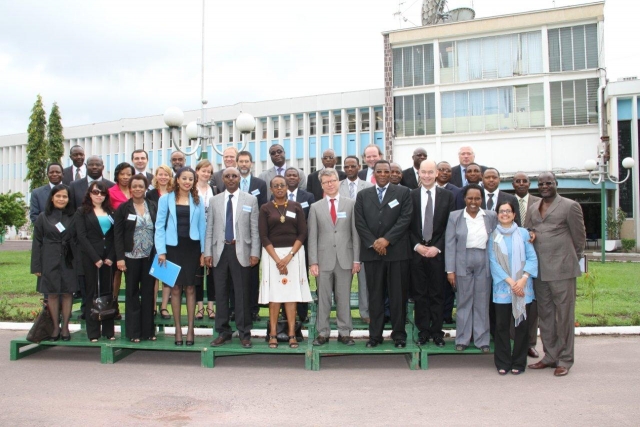Meeting on WHO-EU Policy Dialogue Programme ends in Brazzaville
 Monday 27 February 2013 -- A three-day meeting on the implementation of the WHO-European Union Health Policy Dialogue Programme, ended today in Brazzaville, Congo. The programme supports selected countries in policy dialogue on national health policies, strategies and plans and universal coverage.
Monday 27 February 2013 -- A three-day meeting on the implementation of the WHO-European Union Health Policy Dialogue Programme, ended today in Brazzaville, Congo. The programme supports selected countries in policy dialogue on national health policies, strategies and plans and universal coverage.
The aim of the meeting was to discuss progress made and lessons learnt during the initial year of implementation of the programme in the seven selected countries - Liberia, Moldova, Sierra Leone, Sudan, Togo, Tunisia, and Viet Nam.
Over 60 participants, including EU officials, WHO staff, representatives from Ministries of Health from the selected countries attended the meeting.
Speaking at the opening session, the Deputy Regional Director at the WHO Regional Office for Africa, Dr Matshidiso Moeti, noted that since it began in June 2012, the programme had recorded commendable achievements ranging from assisting in coordinating partners during the development of national health strategic plans as well as contributing to a new culture of stakeholder involvement in the work of health ministries in line with the principles of the Paris Declaration.
She told the participants: “It is important that your deliberations be strategic enough and focused to take into account the need to perform better during the next two years. All the bottlenecks at all levels and settings need to be analysed”. The Deputy Regional Director stressed the need to speak the same language regarding universal coverage, policy dialogue around national health policies, strategies and plans, primary health care (PHC) and all the other relevant aspects that the current project is trying to address.
Dr Moeti also added that it was important that the first group of seven countries benefiting from the programme succeed so that the second group of countries performs even better using lessons learnt earlier.
The WHO-EU programme draws on WHO's convening role, institutional capacity and experience to support countries and provide advice to facilitate national health policy dialogue across programmes, systems and sectors.
_____________________________________________________________
For more information, please contact:
Dr Babacar Drame, tel +472 4139329, e-mail: drameb [at] afro.who.int (drameb[at]afro[dot]who[dot]int)
Collins Boakye-Agyemang tel: +472 413 9420 e-mail; boakyec [at] afro.who.int (boakyec[at]afro[dot]who[dot]int)
Samuel T. Ajibola, tel +472 4139378; e-mail: ajibolas [at] afro.who.int (ajibolas[at]afro[dot]who[dot]int)


